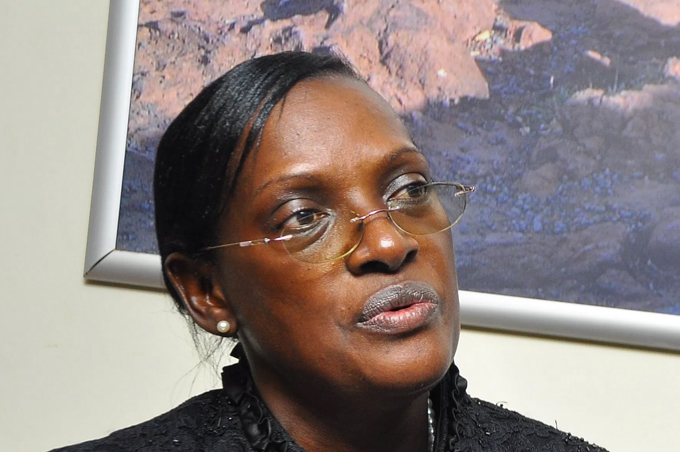A photo montage of Bank CEOs/Managing Directors
The Bank of Uganda (BoU) has issued a rare communication warning banks on the Shs150bn minimum capital requirement they are required to meet by December 2024.
Bank results for the year ended 31st December 2022 analyzed by Business Focus show that many banks are still struggling to increase their core capital as per the requirements of the Central Bank.
Core capital refers to the minimum amount of capital that a bank must have on hand in order to comply with BoU regulations.
In a 6th July 2023 public notice published on Bank of Uganda website, the Central Bank noted that the Minister of Finance, Matia Kasaija while drawing powers under the Financial Institutions Act, 2004 (as amended), issued the Financial Institutions (Revision of Minimum Capital Requirements) Instrument, 2022, on 16th December 2022 revising the minimum capital required for a financial institution licence, an exercise Bank of Uganda whose implementation, says has been successful and remains on course.
Under the instrument, commercial banks were required to maintain a minimum paid-up capital of Shs120 billion, and credit institutions of Shs20 billion by 31st December 2022. These capital thresholds will be further raised to Shs150 billion for commercial banks and Shs25 billion for credit institutions by 30th June 2024.
The Central Bank defended the new changes writing, “The higher minimum paid-up capital requirements are intended to enhance the financial system’s resilience to shocks, promote financial stability, and advance the capacity of the financial institution to meet the growing needs of a dynamic economy. The Bank of Uganda is confident that attainment and maintenance of the revised minimum capital by financial institutions, will promote a strong, stable, and sustainable financial sector.”
The Central Bank also added that as of 30th June 2023, majority of the supervised financial institutions including those deemed large and critical to the smooth functioning of the financial system, complied with the revised capital requirements, while the remaining financial institutions had put in place credible capital restoration plans whose implementation was significantly advanced, and on course to achieve complete compliance with the revised capital requirement within agreed timelines.
Going by the financial reports posted by banks as of 31st December 2022, the banks that met the Shs120bn core-capital requirements included; Stanbic Bank whose core capital stood at Shs1.36Trn. It’s the most capitalised commercial bank in Uganda and it was the only one in the trillion club.
The others that had met the Shs120bn threshold are; Centenary Bank (Shs976.8bn), Standard Chartered (Shs674.6bn), Bank of Baroda (569.6bn), dfcu Bank (Shs544.4bn), Absa Bank (Shs521.85bn), Equity (Shs365bn), Citi Bank (Shs327.58bn), Diamond Trust Bank (Shs255.85bn), Housing Finance Bank (Shs249.52bn), Bank of Africa (Shs150.27bn), UBA (Shs149.41bn) and KBC Bank (Shs144.1bn).
However, there are a number of banks whose core capital falls below the requirements by the Central Bank as of 31st December 2022. However, this website understands that many have already got more capital injection.
As of 31st December 2022, the following banks had their core capital as indicated below; Postbank (Shs119.9bn), NCBA Bank (Shs109.8bn), I&M Bank (Shs68.9bn) and Bank of India (Shs61.6bn).
The others include; Finance Trust Bank (Shs59.9bn), Cairo Bank (Shs59.0bn), Exim Bank (Shs55.68bn), Tropical Bank (54.32bn), Guaranty Trust (41.36bn), Ecobank (Shs34.34bn) and ABC Capital Bank (Shs30.2bn).
Expert Opinion
According to Hassan Kitenda, an analyst, the increase in capital requirements will force banks to revisit their internal operation strategies in terms of strong corporate governance, risk assessment methods, and credit evaluation procedures hence reducing the bank’s credit risk that mainly affects Ugandan banks.
There are also views that Uganda’s banking sector could witness mergers and acquisitions as smaller banks could be swallowed up by giants.
“An increase in capitalisation will force small banks to merge. This will contribute to an increase in the number of products offered, integrated technologies, reduction of operational risks, increased market share which will improve bank stability,” Kitenda says, adding: “…the undercapitalized banks will have to gradually increase their capital or reduce their risky assets to meet the regulatory capital requirements.”
At the time of the infamous Parliamentary probe into the closure of defunct banks in 2018, Bank of Uganda had closed 7 banks in Uganda and these included; Crane Bank Ltd in 2016, Global Trust Bank in 2014, National Bank of Commerce in 2012, The Co-operative Bank in 1999, Greenland Bank in 1999, International Credit Bank Ltd in 1998, and Teffe Bank in 1993. Many of the banks were closed over capital requirements.
The latest bank to be acquired is Orient Bank by I&M Group from Kenya while NC Bank and Commercial Bank of Africa (CBA) merged in 2018 to form NCBA Uganda.
The latest development comes at the time Parliament recently passed into law the Foreign Exchange Amendment Bill 2023 into law, capping the minimum paid up share capital to carry out money remittance business at Shs200 Million, up from Shs50 Million and also increased the minimum paid up share capital to carry out foreign exchange business to Shs50 Million, up from the Shs20 Million in the Principal Act.
Although Parliament approved this change, going forward, the powers to revise the core capital for forex bureaus has been placed into the hands of Governor Bank of Uganda and in the latest amendments, all forex bureaus are required to comply with this provision within six months from the coming into force the Act.





